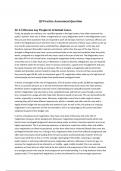Q9 Practice Assessment Question
AC 2.5 Discuss Lay People in Criminal Cases.
Firstly, lay people are ordinary, non -qualified people in the legal system, they often represent the
public's opinion, their role is either a magistrates or a jury. Magistrates work in the Magistrates court,
they are part time volunteers that are required to work 13 full days minimum. Summary offences are
tried in the Magistrates Court and their role is to decide the outcome of these cases, which can be up
to 6 months imprisonment and an unlimited fine. Magistrates are not ‘experts’ in the law, and
therefore represent the public's opinion and interest, rather than the eyes of the law. This is a
strength as Magistrates may have a more emotional take on the case and symbolise what the public
wants, compared to a Judge that will only view a case in the eyes of the law. The Magistrates court
also takes 97% of all criminal cases, meaning the magistrates tend to witness a large proportion of
crime that occurs in their local area. hi Moreover, in order to become a Magistrate, you are required
to be a British citizen for 10 years, have no serious convictions, a good sense of judgement and pass
the ‘good character test’ during an interview. This is a strength as magistrates will be extremely
reliable and therefore can be trusted to make the correct decisions. In terms of their social profile
they must be aged 18-65, with an retirement age of 70, magistrates often make up of a high level of
retired people and are mostly drawn from professional managerial ranks.
In terms of strengths of the role of magistrates, 57% of women make up the 23,400 lay magistrates.
This is a successful amount, as in the law environment there tends to be more men than women,
therefore women magistrates may have more understanding and sympathy towards vulnerable
women. Magistrates may also have a more sympathetic take and look at a case through a human
lens, compared to a judge who will make their decisions based on law only. This can be beneficial for
victims, especially in sensitive cases. Moreover, magistrates come from a wide range of careers,
meaning they will all have different experiences, which is valuable and often not the case with a
legally trained Judge that has typically only worked in Law. As well as this, the process of using lay
magistrates is less expensive as they are volunteers, this is an advantage as the courts have been
subjected to government budget cuts.
In terms of weaknesses of magistrates, they have a low level of diversity, with only 14% of
magistrates having an ethnic background. Moreover, magistrates being predominantly white may
lead to more 'privileged background’ decisions being made, as ethnic minorities opinion’s are not as
highly represented. This is an extreme weakness, as decisions made from white, older and middle -
class magistrates can often be prejudiced, as they have often had a sheltered lifestyle that some less
privileged minorities have not. Linking to this, magistrates often come from affluent backgrounds and
often went to private school leading them to have lucrative, professional jobs, however there are
many issues with this as this is not the ‘average’ upbringing of the public, meaning an ‘average’
public opinion is not being reflected by some magistrates opinions. Moreover in terms of age, it is
common for magistrates to be referred to as ‘middle - aged, middle minded’, this is an extreme
weakness as those who are older tend to be less tolerant and progressive in their mindset, compared
to a younger person who may be more progressive and understanding. It is a big weakness that a few
people under 27 are appointed magistrates, as they are deemed to not have enough experience.




